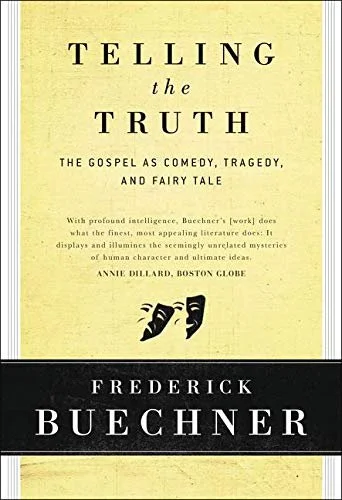To Tell The Truth
Last month, prompted by a rich conversation over tacos with my Aunt Ann and Uncle Larry, I dusted off Frederick Buechner’s book Telling the Truth: The Gospel as Tragedy, Comedy, and Fairy Tale (HarperOne). It’s a book primarily geared toward preachers, but I find it helpful for Christians in general, called as we are to truth-telling in a million different ways.
“It is possible to think of the Gospel and our preaching of it as, above all and at no matter what risk, a speaking of the truth about the way things are,” Buechner writes early in the book. “And it is possible to think of that truth as tragedy, as comedy, and as fairy tale.”
Looking back at my reading history, I see that I had read Telling the Truth twice before, in 2005 and 2009. It was the same me reading the book both times. But that me had changed in important ways. This merits some consideration, I think, as we think about what it means to be readers and people who are not static but are growing, hopefully becoming better friends and neighbors to those entrusted to our care.
So here’s my thesis: there are lessons to be learned by studying our annotations and highlights, especially in the books we’ve read and reread over time.
My first time through Telling the Truth, as a senior in college, I was in the habit of underlining carefully, in pencil, using the edge of a bookmark to ensure straight lines. Four years later, during grad school, I had taken to marking up books with a pen, completely freehand, sometimes almost recklessly.
Here’s one example of the contrast.
As I reflect on how my underlining habits might have changed subconsciously over time, let me share some (partial) clues in hopes that you might just find some parallels with your own life.
At the time of my first reading of Telling the Truth during college, I was immersed in a Christian community that, for all the ways God used it to bless me and others, had strong tendencies bordering on rigidity. I had embraced that way of being in the world. And I sought to embody it, I suppose, all the way down to those perfectly straight lines in the theological books I was reading.
But—not insignificantly—I was writing in pencil.
By the time I revisited Telling the Truth, using black ink to mark up the book in freehand, a lot had transpired in my life of faith. I hadn’t rejected any fundamental Christian beliefs; on the contrary, I had grown in them. I had read the Bible in its entirety by that time and had sought to orient my life accordingly, just as my church had taught me: to go into the world in the name of Jesus on a quest that had implications for every area of life.
Following Jesus in all that he commands had led me to a hospital room in Kenya, where a woman dying of AIDS sang “Blessed be the name of the Lord.” Following Jesus had led me to Cambodia, living with Buddhists, eating snails, having dinnertime conversations using their broken English and my nearly nonexistent Khmer.
Following Jesus had led me to New Orleans in the wake of Hurricane Katrina and to Costa Rica in the aftermath of an earthquake. Following Jesus had led me to take a job helping newly arrived Cuban refugees to furnish their apartments, obtain their Social Security cards, and decipher the difference between junk mail and medical bills.
Simply put, the gospel of Jesus—the tragedy, comedy, and fairy tale of it—had taken root, expanding my horizons, clarifying my theology, and deepening my faith. Somewhere in that process, I had starting writing with a bit more confidence, even permanence, using ink—even while cultivating a greater tolerance for messiness, in life, in church, and in my scribbles on the page.
There is a point in saying all of that, which is this: the context in which we read books plays a significant role in how we internalize them, how they shape us, and how they might even nudge us in new, unexpected directions.
Since reading Telling the Truth twice in my twenties, life has unfolded in ways I could not have anticipated. So it makes sense that in 2022, I’m stopped in my tracks by passages of Buechner’s writing that apparently didn’t make an impression on me in 2005 or 2009.
It’s important to say that I want to keep learning from both of those earlier iterations of me. I want to hold onto the humility of the guy who made annotations in pencil, even if I’m OK leaving his rigidity in the past. I also want to hold on to the boldness of the guy who picked up a pen, even it it means scribbling out my own nonsense now and then.
Stewarding the unfolding Story (and all our lowercase stories) means doing justice to every plot twist along the way. And so we live, the Lord being our helper.

